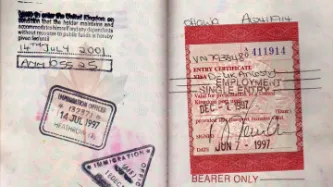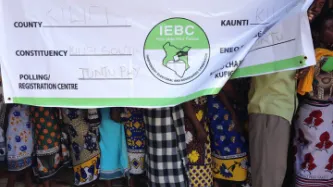Search
Content type: Examples
Cameras repurposed as "fever-detecting" aren't designed for and are not very good at detecting infections, but businesses, airlines, major employers, and public officials are nonetheless reacting to the coronavirus pandemic by spending large sums to buy them without understanding their limitations. The systems can detect elevated skin temperatures, but aren't precise enough to be able to identify the cause. In addition, many people who develop COVID-19 don't have fevers. The scanners have not…
Content type: Examples
It's been two months since the launch of "Perú en us manos", the mobile app promoted by the Peruvian government amidst the Covid-19 pandemic. Until now the app did not accomplish the ambitious goals it set out to.
On its first month the app had detected 1400 risk zones while there where already 36,000 confirmed infection cases. There is little transparency on how those risk zones are estimated. Developers of the app state that only one fifth of the data provided by the Health Ministry is clean…
Content type: Long Read
1. What are the barriers to access safe and legal abortion care?
Abortion is considered a crime in Brazil, except in cases of pregnancy resulting from rape, when it puts the woman's life at risk or, most recently, in cases of fetal anencephaly. Article 273 of the Penal Code also forbids the sale or distribution of medication that is not registered at Anvisa (National Health Agency), which is the case for abortion pills in Brazil. Misoprostol, the active substance of abortive medicines in the…
Content type: Long Read
1. What are the barriers to access safe and legal abortion care?
The Indian state’s approach to reproductive rights historically has focused on population control rather than enhancing individual autonomy and removing structural barriers to reproductive health services, which is reflected in the barriers to provision of services. As a consequence of the early adoption of family planning and population control measures in the 1950s, India was one of the first countries to legislate on abortion…
Content type: Long Read
This research was commissioned as part of Privacy International’s global research into data exploitative technologies used to curtail women’s access to reproductive rights. Reproductive Rights and Privacy Project. Read about Privacy International’s Reproductive Rights and Privacy Project here and our research findings here.
1. What are the barriers to access safe and legal abortion care?
In Kenya, access to abortion care is restricted by the Constitution, which provides that: “…
Content type: Long Read
This research was commissioned as part of Privacy International’s global research into data exploitative technologies used to curtail women’s access to reproductive rights.
Read about Privacy International’s Reproductive Rights and Privacy Project here and our research findings here.
1. What are the barriers to access safe and legal abortion care?
Even though abortion is legal in certain cases in Argentina, different types of barriers restrict the access to legal abortions, contribute…
Content type: Long Read
This research was produced by Paz Peña as part of Privacy International’s global research into data exploitative technologies used to curtail women’s access to reproductive rights. Reproductive Rights and Privacy Project. Read about Privacy International’s Reproductive Rights and Privacy Project here and our research findings here.
1. What are the barriers to access safe and legal abortion?
According to figures from the Ministry of Health, more than 33 thousand clandestine abortions are…
Content type: News & Analysis
On 29 May, Niger’s Congress voted on a law allowing for broad interception powers of certain electronic communications by the government. The bill makes it lawful for the government to approve the interception of communications without appropriate safeguards or oversight mechanisms.
The law passed with 104 votes – the Nigerien parliament has 171 members – without the participation of the opposition that boycotted the law. The opposition claimed that
the law will allow those, for…
Content type: Long Read
This research was commissioned as part of Privacy International’s global research into data exploitative technologies used to curtail women’s access to reproductive rights.
Read about Privacy International’s Reproductive Rights and Privacy Project here and our research findings here.
1. What are the barriers to access safe and legal abortion care?
Legal barriers
To identify the barriers experienced by women to access safe and legal abortion care, we have to understand the legal picture…
Content type: Advocacy
Last week, Privacy International joined more than 30 UK charities in a letter addressed to the British Prime Minister Boris Johnson, following his recent declaration, asking him to lift No Recourse to Public Funds (NRPF) restrictions.
Since 2012, a ‘NRPF condition’ has been imposed on all migrants granted the legal right to live and work in the UK. They are required to pay taxes, but they are not permitted to access the public safety net funded by those taxes.
This is not a topic we are known…
Content type: Long Read
It is common for families with no recourse to public funds who attempt to access support from local authorities to have their social media monitored as part of a ‘Child in Need’ assessment.
This practice appears to be part of a proactive strategy on the part of local authorities to discredit vulnerable families in order to refuse support. In our experience, information on social media accounts is often wildly misinterpreted by local authorities who make serious and unfounded allegations…
Content type: Report
It is common for families with no recourse to public funds who attempt to access support from local authorities to have their social media monitored as part of a 'Child in Need' assessment. This practice appears to be part of a proactive strategy on the part of local authorities to discredit vulnerable families in order to refuse support. In our experience, information on social media accounts is often wildly misinterpreted by local authorities who make serious and unfounded allegations…
Content type: Long Read
Dear Sir/Madam,
Freedom of information act request
RE: Social media monitoring / social media intelligence
FOIA REQUEST
For definition of social media intelligence please see background explanation below. We further note the comments of the Office of Surveillance Commissioners Annual Report 2016 cited below.
1. In 2016 the Rt Hon Lord Judge, then Chief Surveillance Commissioner, wrote to all Local Authorities regarding use of social media in investigations. Please confirm whether you are…
Content type: Report
SUMMARY
In the UK, local authorities* are looking at people’s social media accounts, such as Facebook, as part of their intelligence gathering and investigation tactics in areas such as council tax payments, children’s services, benefits and monitoring protests and demonstrations.
In some cases, local authorities will go so far as to use such information to make accusations of fraud and withhold urgently needed support from families who are living in extreme poverty.
THE PROBLEM
Since 2011…
Content type: Long Read
The Chief Surveillance Commissioner, The Rt Hon Sir Christopher Rose’s Annual Report 2011 - 12 did not refer to social networks but to overt investigations using the internet as a surveillance tool, stating that:
“5.17 A frequent response to my Inspectors’ enquiries regarding a reduction in directed surveillance is that ‘overt’ investigations using the Internet suffice. My Commissioners have expressed concern that some research using the Internet may meet the criteria of directed…
Content type: News & Analysis
GDPR was hard won. PI, together with other civil society actors, fought from the beginning for a version of the law that offers the strongest rights and protections in the face of intense industry lobbying.
Holding the hidden data ecosystem to account
Two years ago, we committed to using GDPR to seek to hold to account the hidden data ecosystem - those companies that amass and exploit large amounts of our data for profit.
Here’s some of the action we’ve taken:
In Nov 2018,…
Content type: Examples
The state of Utah gave the AI company Banjo real time access to state traffic cameras, CCTV, and public safety cameras, 911 emergency systems, location data for state-owned vehicles, and other data that the company says it's combining with information collected from social media, satellites, and various apps in order to detect anomalies in the real world and alert law enforcement to crimes as they are happening. The company claims its algorithm can do all this while stripping all personal data…
Content type: Examples
Our partners from IPANDETEC in Panamá wrote about privacy and personal data in the context of the COVID-19 response, stating that throughout Central America, data protection laws and patient privacy lean towards respecting their privacy before the scientific interest of their cases.
Link: https://www.ipandetec.org/2020/03/18/coronavirus-privacidad-datos/
Content type: Long Read
This research was commissioned as part of Privacy International’s global research into data exploitative technologies used to curtail women’s access to reproductive rights. Reproductive Rights and Privacy Project. Read about Privacy International’s Reproductive Rights and Privacy Project here and our research findings here.
Content type: Case Study
From 2019 to 2020, citizens of economically disadvantaged neighborhoods in the Netherlands were subject to unlawful invasion of their privacy by the Dutch government’s automated welfare fraud detection system. The system is known as System Risk Indicator (SyRI), and the Dutch government used it to generate risk scores for individual citizens by combining personal data including “identity, labor, personal estates and property, education, pension, business, income and assets, pension and debts.…
Content type: Examples
Two million people downloaded Australia's COVIDSafe app in the first four days it was available; the government's goal is to reach 10 million, or about 40% of the population. Users are asked for a (not necessarily real) name, age, mobile number, and postal code. The app exchanges a Bluetooth handshake when it comes within 1.5 metres of another app user, then logs the handshake and encrypts the exchange.
The data is used to notify users if they have come within close contact for 15 or more…
Content type: Examples
The automated facial recognition company Clearview AI has suggested to US federal and state authorities that its facial biometrics could leverage cameras already in place at gyms and retailers in order to identify individuals in the interests of contact tracing.
Simultaneously, the company is asking for a stay in a privacy lawsuit in federal court in Illinois under the state's Biometric Information Privacy Act. The company wants the case to be moved to the Southern District of New York, where…
Content type: Long Read
This article has been written by our partner organisation InternetLab. Read this article in Portuguese here.
Over the last months, the organisation InternetLab has researched privacy, data protection, gender, and social protection, focusing on the beneficiaries of the Bolsa Familia Program (PBF). The PBF is the most extensive Brazilian cash transfer program, and its functioning is linked to CadÚnico, a database that comprises 40% of the country’s population. Moreover, it is a program whose…
Content type: Case Study
The run up to Kenya’s 2017 elections was extremely tense. Kenya has a history of violently fought elections and there was fear this election would be no different. It was in this tense environment, that companies like Cambridge Analytica and Harris Media – and their digital offerings - got involved in the election campaigns.
Cambridge Analytica’s business model is by now familiar, they compiled a huge amount of data points, often through illegal means, to create profiles on individuals –…
Content type: Long Read
This week saw the release of a coronavirus tracking app within the United Kingdom, initially to be trialled in the Isle of Wight. Privacy International has been following this closely, along with other ‘track and trace’ apps like those seen in over 30 other countries.
The UK’s app is no different. It is a small part of a public health response to this pandemic. As with all the other apps, it is vital that it be integrated with a comprehensive healthcare response, prioritise people, and…
Content type: Long Read
Coronavirus-related lockdown measures have impacted almost 2.7 billion workers, with some countries seeing unprecedented levels of applications for welfare benefits support.
In response, emergency relief legislation for welfare recipients has been fast-tracked worldwide, from the UK to Brazil. These measures, combined with the growing awareness of Covid-19's differentiated impact along the fault lines of class, race, gender and legal status, rightly seek to address the needs of…
Content type: Advocacy
For a long but fun analysis of the current competition and data state of play in the UK, click here.
Background
PI broadly welcomes the CMA’s interim findings, many of which correspond with issues of longstanding concern to PI and with the points raised in our response to the CMA’s Statement of Scope.
This includes the indication that Google and Facebook have a dominant or strategic position in major elements of the digital advertising market which can -at least, partially- be attributed to the…
Content type: Long Read
UPDATE 21/07/2020: On Monday July 20th, the Israeli parliament approved a new bill allowing the Ministry of Health to rely again on the Intelligence Services to track people who may have been exposed to Covid 19 when the number of new cases reaches 200 and above per day. The authorisation is then granted for three weeks and can be extended if the numbers have not decreased. The new law will be effective until January 2021. As of July 21st and for at least the next three weeks, the Intelligence…
Content type: Case Study
IMSI catchers – International Mobile Subscriber Identity catchers – are a particularly intrusive technology being used by police to monitor protesters and intercept their personal information and communications.
IMSI catchers have been used - officially or in secret - across the globe to monitor protests, including in the US and Germany; in the UK, police forces have refused to disclose any information on their use but documents obtained by the Bristol cable show that nine police forces have…




















